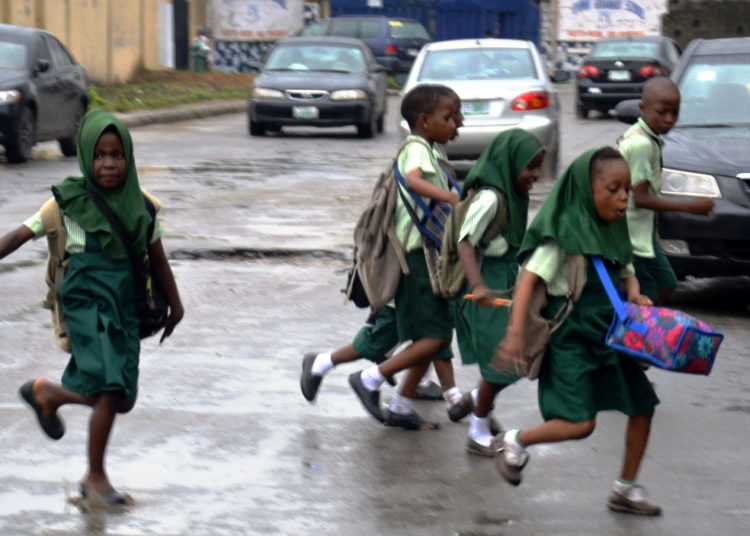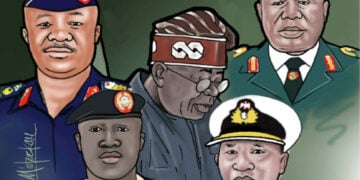We are at that time of the year when children are excited about returning to school but one can see no excitement in parents for obvious reasons!
As a new academic session beckons, after the long vacation, parents have to provide educational resources, school fees and all else that are required for their children to return to school.
Many parents have been impacted negatively by the present state of the Nigerian economy and they are struggling to face the challenges of school resumption. For them, this is a time to be awake at night, tossing and turning, thinking about where to get the money to pay school fees, school bus, buy schoolbooks, school bags, lunch boxes and much more.
The children are usually excited to return to school, but, many parents are simply not yet ready for all that this season entails!
Many parents are among the over 100million Nigerians living below poverty line, where eating two square meals in a day is a luxury.
These poverty-stricken Nigerians also include those whose salaries are not up to the national minimum wage of N30,000 at a time when a bag of local rice is higher than the minimum wage. Yet, these classes of parents have to somehow find the money for their kids to return to school because for many poor parents, the importance of education cannot be overemphasized.
It was late president of South Africa, Nelson Mandela who said that “Education is the most powerful weapon we can use to change the world!” He said these impactful words while speaking on the importance of education in society. Education is a stairway to the growth and development of humankind. Education shapes society into a better world.
It is essential to understand the importance of education in today’s society. In simple words, education is a process of learning or acquiring knowledge, skills, values, morals, beliefs, and habits.
There are several steps involved in the entire process of obtaining and providing education. It includes teaching, training, discussion, research, storytelling, and similar other interactive activities.
Education can be both formal and informal through the method of teaching which is called pedagogy. Formal education is achieved through educational institutions such as preschool, primary school, secondary school, colleges, and universities. However, informal education comes from self-directed learning, evidence-based learning, open learning, and electronic learning.
Education in any of its many form vitalizes the life of an individual and the society as a whole. Let us try to understand why it is important to seek education and what is the importance of education in our country. Education is important in every society. It is the foundation of future development, it shapes the lives of individuals and helps mankind achieve a better society. Education is the cornerstone of modern society. It is the source of technology and technology products. Without education, the western world could never have achieved the milestones thy have recorded in human development and human happiness.
In Nigeria, the present generation needs education to achieve better employment opportunities and turn themselves into better citizens. No one can secure a high income job without education since such high income jobs are usually reserved for skilled persons. And what other way do people acquire skills if not through education and training.
Societal growth and harmony are possible when people realize the importance of literacy and education for society. Modern society has modern problems and by developing problem-solving skills, the educated sector can solve many human social issues. The meaning and importance of education in society become clear when we see the economic growth
that is possible through the application of sound policies and programmes. The technocrats move society in the right direction because they understand the technics and necessary policies that move society forward. Their achievements transform the lives of everyone including those belonging to marginalized communities as well.
A country’s economic prosperity is highly dependent on the educated population it has. However, despite the widely known importance of education the sector is faced with numerous challenges, the worst of which is negligence by all tiers of government in Nigeria.
Thirty-two years after the United Nations Educational, Scientific and Cultural Organisation, UNESCO, recommended that developing nations give up to 25 per cent of their annual budget to public education, Nigeria’s allocation to the sector is still less than 10 per cent. Consequently, of the N55.3 trillion allocated to the education sector by the federal government in the last six years (2016-2021), only N3.5 trillion had been actually released to the sector, this paltry figure represents less than ten per cent. In comparison, though Ghana and South Africa have not actually met up to the recommended 25 per cent by UNESCO, these two countries have done far more than Nigeria. They allocated a maximum 23 per cent and 16.7 per cent respectively.
In 2016, of the total budget of N6.06 trn, the sum of N369.6 billion or 6.7% of the budget was allocated to public education in the country. In 2017, N550 bn or 7.38% was allocated to education out of N7.29 trn budget, while in 2018, N605.8 bn or 7.04 % was given to education out of N9.2 trn budget. In 2019, N620 bn or 7.05% was allocated to education out of the budget of N8.92 trn, while in 2020, N671.07 bn or 6.7% was given to education out of N10.33 trn budget. In 2021, N742.5 bn or 5.6% was allocated to education out of a budget of N13.6 trn.
On the other hand, according to reports by the World Bank, Ghana allocated 23.81% of its national budget for education in 2015, 22.09% in 2016, 20.1% in 2017 and 18.6% in 2018. For South Africa, it has kept increasing allocations to the education sector from R246 billion or 16.7 % in 2018, R310bn in 2019, R 387bn in 2020 and projected that it’ll hit R416 bn by 2023/24. Though South Africa’s allocations in the
period varied from 14.4% to 16.7% of the total budgets in the years under review, the performance was much better than Nigeria’s. The poor funding of education has reduced the quality and outcome of public education in Nigeria. This has resulted to the intervention of the private sector and faith-based organisations in the school sector.
Such schools though often better than public schools have the challenge of higher fees. Throughout Nigeria, fee increases have exceeded the rate of inflation over the last few years. This simply means that many parents are finding it harder to fund their children’s education. Many schools struggle to balance being an educational provider, a charity and a business.
In most states of the country private schools are made to pay fees and levies including the annual renewal/operational fee, waste management fee, fire service fee, and development levy among others, not minding the fact that education is a social investment that is meant to benefit the society.
And as schools resume this session, schools’ owners are not only concerned about how to provide quality education that would prepare the children for the 21st Century world, they have to grapple with the nation’s insecurity. Indeed, many schools have trebled their security allocation all in a bid to ensure safety of their pupils. Of course, this puts more pressure on the schools to even up their fees some more. Given the state of insecurity schools have to increase security presence in their schools in order to give parents confidence that their children are safe while at school. They also have to provide extra security for schools’ buses. All these and more have added to the cost of running private schools in Nigeria and these costs are invariably passed to parents.
The solution to the many problems of the education sector in Nigeria lies in government meeting its obligation by making sure that the UNESCO budgetary benchmark is met and even surpassed just as Rwanda has done. In doing this the private schools must also be factored into government funding disbursements since those attending such schools are also Nigerians whose fundamental rights to education will be breached if they are denied access to such funding.
Government should also waive the unnecessary levies imposed on private schools and should see these schools as playing complementary role to what government is doing in the sector. The government should also improve security to remove the burden of securing schools from private schools’ owners, so that they can concentrate their resources to the provision of quality and functional education for the development of the country.
MAY NIGERIA REBOUND.





